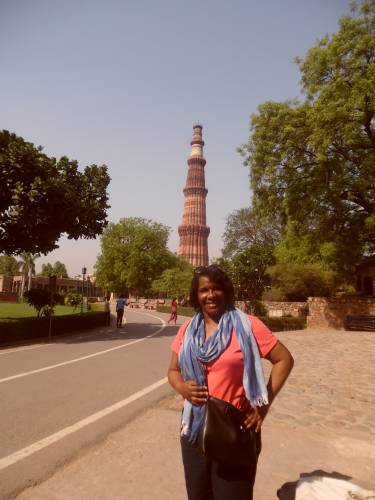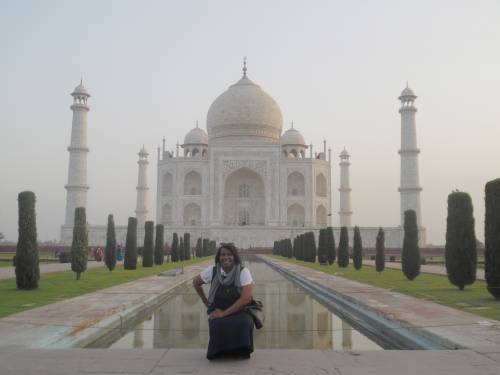It all started with a high school economics book.
Melody Muldrow’s passion for economics was born when a high school teacher gave her an economics textbook to prepare for a city-wide high school economics competition. She spent an entire weekend thumbing through the book, soaking in as much information as she could. Muldrow was instantly hooked.

“Economics would forever change my life by providing me with opportunities that a young girl from Little Rock, Ark., would have never imagined in her wildest dreams,” Muldrow said. “My younger self would have never envisioned that I would obtain a Bachelors of Arts degree in economics from the University of Arkansas at Little Rock, and a Master of Science in economics and community development from the University of North Texas. Nor would my younger self foresee me working with Arkansas lawmakers, state agencies, community leaders and various Arkansas business leaders, aiding them in finding solutions to improving the economic well-being of the state and the inhabitants.”
Muldrow’s passion for economics has led her to the University of Missouri to pursue her PhD in economics through the College of Agriculture, Food and Natural Resources (CAFNR) Division of Applied Social Sciences, a path she began in 2019. Her dedication to her degree and desire to make an impact in the world has led her to be honored as one of the three students named George Washington Carver Graduate Fellows, an award that seeks to attract and support under-represented scholars into MS and PhD degree programs in CAFNR.
“After receiving my official notification from the George Washington Carver Graduate Committee, I did a happy dance in my apartment!” Muldrow said. “I know this prestigious fellowship will help me continue my education so that I can complete important research that will make a difference in communities that seek solutions and in the lives of people who need support.
“Diversity is vital in any institution. This award is a reminder that academic excellence comes in all forms and everyone can contribute to the goals and ideals of the university.”
Muldrow’s research is focused on poverty and income inequality. She is working closely with her advisor, Corinne Valdivia, a professor of agricultural and applied economics, on a variety of projects, including reviewing literature on the resilience of minority small businesses in rural communities of the United States.
“Being from Arkansas, I have seen firsthand the devastating effects of poverty on marginalized communities,” Muldrow said. “My home state faces many challenges, like low educational attainment, high levels of unemployment, an economy heavily dependent on low-wage jobs and counties with a high rate of poverty that exceeds the national poverty rate. These challenges make it difficult for state and local officials to bring in companies and businesses that will spark long-term economic development. Additionally, I am extremely concerned about lack of opportunity in the rural counties of the Arkansas Delta, a disadvantaged region in the state where more than 20 percent of the population has lived in poverty for over 30 years.”
Her research is incredibly relevant as the entire globe deals with the COVID-19 pandemic. The literature review Muldrow is conducting allows her to interview minority and women businesses in rural communities that face disasters.
“My research is of particular importance during the COVID-19 pandemic, because many states in the Deep South, such as Arkansas, Mississippi and Alabama are grappling with the economic consequences of the pandemic,” Muldrow said. “As the COVID crisis continues, these states will experience increasing poverty rates and a widening of income disparities. Understanding how to alleviate poverty and address income inequality is vital now, more than ever before.

“It has also been a delight working with Dr. Valdivia, especially since I’m learning so much about social capital and its impact on minority business owners’ ability to develop resilience against natural disasters. This research is important, particularly as COIVD-19 has such a devastating effect on diverse communities in the U.S.”
Muldrow said her professional goal is to be an executive director of a research facility for a metropolitan university, such as the Arkansas Economic Development Institute (AEDI) at the University of Arkansas at Little Rock. AEDI’s mission is to enhance the life of Arkansans through community economic development research and analysis, technical assistance, and training to advance the economy and economic development throughout Arkansas and beyond. Muldrow said that mission is in line with her future goals, as she works to provide lawmakers, community leaders, state agencies, businesses and households with all the information they need to make the best-informed decisions they can, especially as individuals are faced with limited resources but many needs and alternatives.
“As an assistant research specialist for the Arkansas Economic Development Institute, I had the opportunity to see how AEDI played a vital role in helping rural communities achieve sustainable economic development,” she said. “Participating in that excellent work at a research facility fostered my desire to become an executive director of a research facility. As a second-year doctoral student, I’m one step closer to my dream job; words cannot express how gratifying it is to be closer to achieving my goals.”
After finishing her bachelor’s degree at the University of Arkansas at Little Rock, Muldrow moved on to the University of North Texas, as she couldn’t find a university in Arkansas that offered a master’s program in economics that she was focused on pursuing. Coming to MU for her PhD work seemed like a natural fit.
“Obtaining a PhD in economics has always been a dream of mine,” Muldrow said. “After reviewing the degree requirements for a PhD in agriculture and applied economics from the University of Missouri, I knew this doctoral program was a perfect fit for me.”